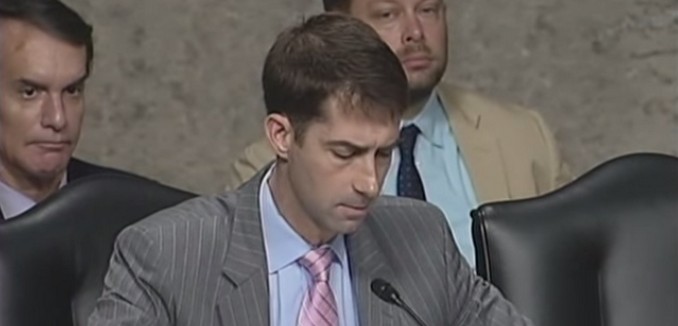Congress must reject the nuclear deal with Iran because it will “significantly degrade our national security,” Sen. Tom Cotton (R – Ark.) and Rep. Ron DeSantis (R – Fla.), both veterans of Operation Iraqi Freedom, wrote in an op-ed published Thursday in Time.
Cotton and DeSantis noted that the fails to stop “Iran’s quest for a nuclear weapon” and will provide Iran with billions of dollars in unfrozen funds that it can use to boost its terrorist proxies. They also enumerated a number of positions on which the administration retreated.
During his reelection campaign, President Obama also promised that any deal with Iran would require Iran to “give up its nuclear program and abide by the U.N. resolutions that have been in place,” which do not permit Iran to enrich uranium. The president said flatly that “the deal we’ll accept is [the ayatollahs] end their nuclear program. It’s very straightforward.” In fact, it didn’t end up being so straightforward. The deal goes beyond the mere acceptance of an Iranian nuclear program; it requires the international community to facilitate Iran’s program, even to assist Iran in protecting its program from sabotage. Just a few years ago, a deal that permitted Iran to develop advanced centrifuges would have been unthinkable. The deal makes the international community, including the United States, active sponsors of Iran’s development of a nuclear weapons capability fortified against outside efforts to sabotage it.
When explaining the deal to the American people, President Obama said it was based on verification, not trust. Yet this deal forces us to rely on a convoluted bureaucratic process to even initiate the inspections of undeclared nuclear sites that are critical to ensure that Iran is not assembling a nuclear weapon. Iran can drag that process out for 24 days, concealing any offending conduct in the meantime. This is a far cry from “anytime, anywhere” inspections his administration lauded earlier in the negotiating process.
Cotton and DeSantis called on Congress to reject the current deal and to insist on one “that actually requires Iran to completely disarm its nuclear program.” They pointed out other aspects that make the deal even less palatable.
[I]f violations are identified the deal includes an explicit provision relieving Iran of its obligations under the deal in the event that the sanctions are reinstated. This represents a “nuclear snapback” that will likely negate the prospect of imposing sanctions in response to Iranian violations. Worse, the deal even lifts sanctions on Iran’s Revolutionary Guard Corps, including Quds Force Commander Qassem Soleimani, whose activities killed so many American servicemen in Iraq.
Rep. Brad Sherman (D – Calif.) said Thursday that because most restrictions on Iran’s nuclear program expire after fifteen years, “We’re going to have force a re-negotiation of this deal, if not now, then in the years to come.”
[Photo: Senator Tom Cotton / YouTube ]




